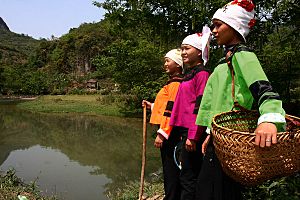Zhuang facts for kids

Zhuang people in ethnic clothes, Guangnan, 2008
|
|
| Total population | |
|---|---|
| 18 million | |
| Regions with significant populations | |
| Languages | |
| Zhuang languages, Cantonese, Mandarin, Pinghua | |
| Religion | |
| Indigenous Zhuang Shigongism (Moism) Minority Christianity, Buddhism and Taoism |
|
| Related ethnic groups | |
| Buyei Tày, Tai/Dai and Nung (Vietnam) |
| Zhuang | |||||||||||||||||||||||||||||||||
|---|---|---|---|---|---|---|---|---|---|---|---|---|---|---|---|---|---|---|---|---|---|---|---|---|---|---|---|---|---|---|---|---|---|
| Chinese name | |||||||||||||||||||||||||||||||||
| Simplified Chinese | 壮族 | ||||||||||||||||||||||||||||||||
| Traditional Chinese | 壯族 or 僮族 | ||||||||||||||||||||||||||||||||
| Hanyu Pinyin | Zhuàngzú | ||||||||||||||||||||||||||||||||
|
|||||||||||||||||||||||||||||||||
| Sawndip autonym | |||||||||||||||||||||||||||||||||
| Chinese | 佈僮 | ||||||||||||||||||||||||||||||||
| Hanyu Pinyin | Bùzhuàng | ||||||||||||||||||||||||||||||||
|
|||||||||||||||||||||||||||||||||
| Thai name | |||||||||||||||||||||||||||||||||
| Thai | จ้วง | ||||||||||||||||||||||||||||||||
| RTGS | Chuang | ||||||||||||||||||||||||||||||||
| Zhuang name | |||||||||||||||||||||||||||||||||
| Zhuang | Bouxcuengh (pronounced //) | ||||||||||||||||||||||||||||||||
The Zhuang people are a large group of people who mostly live in the Guangxi Zhuang Autonomous Region in southern China. They are known for their unique culture and language. Some Zhuang people also live in the Yunnan, Guangdong, Guizhou, and Hunan provinces.
The Zhuang are one of the 56 ethnic groups that the Chinese government officially recognizes. They are the largest minority group in China, with about 18 million people. They are related to other groups like the Buyi and the Tay in Vietnam.
Contents
Who Are the Zhuang People?
The Zhuang people are an ethnic group. This means they share a common culture, language, and history. They have lived in southern China for a very long time. Their history is rich with traditions and stories.
Where Do the Zhuang Live?
Most Zhuang people live in the Guangxi Zhuang Autonomous Region. This is a special area in southern China. It is called "autonomous" because the Zhuang people have some self-governance there. This region is known for its beautiful mountains and rivers.
Some Zhuang communities also live in nearby provinces. These include Yunnan, Guangdong, Guizhou, and Hunan. They often live in rural areas, close to nature.
What Languages Do They Speak?
The Zhuang people speak their own languages, called Zhuang languages. These languages are part of the Kra-Dai language family. This family includes languages spoken in other parts of Southeast Asia.
Many Zhuang people also speak Mandarin Chinese, which is the official language of China. Some might also speak Cantonese or Pinghua, depending on where they live.
Zhuang Culture and Traditions
The Zhuang culture is very vibrant. It includes unique music, dances, and festivals. They are known for their colorful clothing and beautiful handicrafts. Many of their traditions are connected to farming and nature.
Traditional Clothing
Zhuang clothing is often made from cotton or silk. It features bright colors and intricate embroidery. Women often wear jackets with long skirts or trousers. Men usually wear simpler clothes. Different areas might have slightly different styles.
Festivals and Celebrations
The Zhuang people celebrate many traditional festivals. One important festival is the Gexu Festival. It is a time for singing, dancing, and meeting new people. Another is the Devil Festival, where people honor their ancestors. These festivals are often filled with lively music and delicious food.
Zhuang Music and Dance
Music and dance are a big part of Zhuang life. They use instruments like drums, gongs, and flutes. Their folk songs often tell stories about nature, love, and daily life. Group dances are common during festivals and celebrations.
What Are Their Beliefs?
Many Zhuang people follow a traditional religion called Zhuang Shigongism (also known as Moism). This religion involves worshipping ancestors and nature spirits. They believe that spirits live in mountains, rivers, and trees.
Some Zhuang people also practice other religions. These include Buddhism, Taoism, and Christianity. These beliefs often mix with their traditional customs.
Images for kids
 | George Robert Carruthers |
 | Patricia Bath |
 | Jan Ernst Matzeliger |
 | Alexander Miles |


